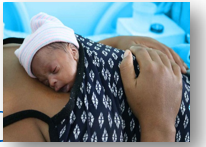- Reference Number: HEY1052/2023
- Departments: Maternity Services, Neonates
- Last Updated: 1 February 2023
Welcome to Transitional Care
This leaflet has been produced to give you general information. Most of your questions should be answered by this leaflet. It is not intended to replace the discussion between you and the healthcare team, but may act as a starting point for discussion. If after reading it you have any concerns or require further explanation, please discuss this with a member of the healthcare team.
What is Transitional Care?
Keeping mothers and babies together should be the cornerstone of newborn care. Transitional care means ‘in between care’ and is for babies who need a little more nursing care and monitoring than the routine care that all babies receive on the maternity ward. It supports babies to stay with their mother and mother is classed as a primary carer for baby rather than going to the Special Care Baby Unit. Some of the benefits of Transitional Care for mother and baby are;
bonding, more opportunity for skin to skin contact, baby led feeding and establishment of breast feeding, 24 hours support with feeding and medical support if needed, helps building confidence in parenting, and family friendly environment, reducing risk of hospital acquired infection.
t 
Where is the Transitional Care Unit?
The Transitional Care Unit is situated between Maple and Rowan Ward within the maternity hospital. It is staffed by neonatal nurses and neonatal doctors.
Why will my baby be admitted to the Transitional Care Unit?
Your baby maybe admitted to the Transitional Care Unit after spending some time on the neonatal unit or maybe admitted with you from the delivery suite. There are several reasons why your baby may be admitted to the Transitional Care Unit for example:
- babies born 5 – 7 weeks early
- your baby may be small
- your baby may need help to keep warm or with feeding
- your baby may need photo-therapy (light treatment) for jaundice
- your baby may need treatment with antibiotics
Each baby will be assessed by the neonatal team for admission to the Transitional Care Unit.
What happens when your baby has been admitted to the Transitional Care Unit?
Your baby will stay with you and be cared for by you with support from the Transitional Care team and a midwife will provide your maternity care. You will be fully involved in the planning and care of your baby, including help with feeding and how to care for your baby. This will be discussed with you at the time of admission. Your baby will be reviewed daily by a neonatal consultant.
How long will I need to stay on the Transitional Care Unit?
Most babies will remain an inpatient on the Transitional Care Unit between 5 – 14 days. However because the length of stay depends on your baby’s progress, this stay may be shorter or longer.
Things you will need for your baby on the Transitional Care Unit
- Cot sheets
- Blankets
- Nappies
- Cotton Wool
- Baby clothes
The Transitional Care Unit have a stock of premature baby clothes, blankets and sheets that are washed on the premises which you can use if you prefer.
Choosing a birth companion to stay
Each mother is allowed one of their chosen birth partners to stay as their supportive companion on the Transitional Care Unit. Their role is to actively support you and your baby, with feeds, changing nappies and learning parental skills with you. Birth companions will be provided with a reclining chair to sleep on, a duvet and a pillow. Birth companions must be fully dressed at all times on the ward, including footwear. Birth companions cannot leave the ward between 11.00pm – 8.00am. This is to ensure the ward is kept safe overnight.
Visiting times on the Transitional Care Unit
| 9:00am – 9.00pm | Birth companions |
| 3:00pm – 4:00pm and 6:00pm – 7:00pm
3:00pm – 4:00pm |
Second birth partner
Children (Siblings) |
Infection Control
Hands must be washed on arrival in the room and gel before and after touching the baby. We advise that you do not change your baby on the bed and request that all visitors use the chairs provided and not sit on the beds. Please ensure your visitors maintain strict hand washing / use of gel when visiting. If visitors are unwell please ask them not to visit the Transitional Care Unit as the babies are small and vulnerable.
Transitional Care Unit Facilities
Hospital meals are provided for mothers; there is a small kitchen area on the Transitional Care Unit for you and your birth companion to make hot drinks, a fridge to store food and drinks and a microwave to warm up food should you wish to bring food in. There are also food and drink catering facilities available within the hospital. There are several 24 hour vending machines and hot drinks machines. The opening times for onsite food and drink catering facilities are:
- Orchard Café – Ground floor Women and Children’s Hospital – Monday to Friday 8.30am – 5.00pm
- Nourish Restaurant – 1ndfloor Tower Block – 5 days a week 7.30am – 7:30pm and Sat and Sunday 8:00 – 2:00 pm
- Fountains Café –Ground Floor Eye Hospital – Monday to Friday 10.00am -4.00pm
- Ground Floor Pod – Ground Floor Tower Block – 7 days a week – 7.30am – 7.30pm
- Costa Coffee – Ground Floor Tower Block – 07:30 – 07:30 5 days a week and Sat and Sun 8:30 – 4pm
Meal times on the ward are protected, no visitors or birth companions will be allowed admission or be able to leave the ward between 11.45 am and 12.15pm and 4.45pm – 5.15pm while the hot food and drink trolleys are out on the ward.
Alcohol is not permitted on Transitional Care Unit and smoking is not permitted within the hospital buildings or grounds of the hospital.
Security
All babies wear 2 identity bands on their ankles and will include your baby’s name, date of birth and hospital number. If the identify bands fall off, please ask a member of staff to replace them immediately. Rowan and Maple ward (access to the Transitional Care Unit) is locked at all times and access is gained only by an intercom system, please do not allow anyone to follow you onto the ward.
Getting ready for home
Before going home your baby will need to be:
- Feeding well
- Gaining weight
- Maintaining their temperature in the cot
Your baby will have a hearing test and be examined by the doctors before discharge as part of the national screening programme.
You will need to register your baby’s birth and register baby with your doctor. Please inform nursing staff if you have changed your address and / or doctor’s details
The Transitional Care Team will advise, support and discuss the relevant following topics with you
- Skin to skin
- Bathing and Top to Toe wash
- Expressing and Breastfeeding
- Bottle feeding (making feeds, cleaning of equipment)
- Safe sleeping
- Basic resuscitation
- Giving medication
- Coping with crying
- Home Nasogastric Tube feeding
Community Care
Your baby may be followed up at home by our Neonatal Continuing Care Team who will monitor your baby’s weight, feeds and progress. Alternatively, care maybe provided by a community midwife. You will be advised which team will visit you prior to discharge.
If your baby requires a follow up appointment after discharged from hospital it will be sent out to you by post.
Contact
Should you require further advice on the issues contained in this leaflet, please do not hesitate to contact the Transitional Care Team:
Call us on 01482 604415
This leaflet was produced by the NICU Department, Hull University Teaching Hospitals NHS Trust and will be reviewed in 2026.
General Advice and Consent
Most of your questions should have been answered by this leaflet, but remember that this is only a starting point for discussion with the healthcare team.
Consent to treatment
Before any doctor, nurse or therapist examines or treats your child, they must seek your consent or permission. In order to make a decision, you need to have information from health professionals about the treatment or investigation which is being offered to your child. You should always ask them more questions if you do not understand or if you want more information.
The information you receive should be about your child’s condition, the alternatives available for your child, and whether it carries risks as well as the benefits. What is important is that your consent is genuine or valid. That means:
- you must be able to give your consent
- you must be given enough information to enable you to make a decision
- you must be acting under your own free will and not under the strong influence of another person
Information about your child
We collect and use your child’s information to provide your child with care and treatment. As part of your child’s care, information about your child will be shared between members of a healthcare team, some of whom you may not meet. Your child’s information may also be used to help train staff, to check the quality of our care, to manage and plan the health service, and to help with research. Wherever possible we use anonymous data.
We may pass on relevant information to other health organisations that provide your child with care. All information is treated as strictly confidential and is not given to anyone who does not need it. If you have any concerns please ask your child’s doctor, or the person caring for your child.
Under the General Data Protection Regulation and the Data Protection Act 2018 we are responsible for maintaining the confidentiality of any information we hold about your child. For further information visit the following page: Confidential Information about You.
If you need information about your child’s (or a child you care for) health and wellbeing and their care and treatment in a different format, such as large print, braille or audio, due to disability, impairment or sensory loss, please advise a member of staff and this can be arranged.
Your newborn baby’s NHS number
An NHS number is allocated to everyone whose birth is registered with a Registrar of Births and Deaths in England and Wales. You already have an NHS number and your baby will be assigned an NHS number soon after birth. Your NHS number is unique to you and provides a reliable means of linking you to the medical and administrative information we hold about you. NHS numbers are allocated on a random basis and, in themselves, provide no information about the people to whom they relate.


